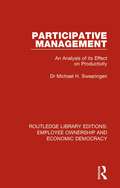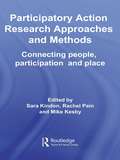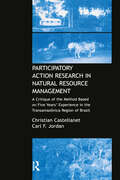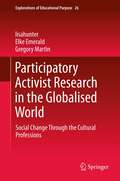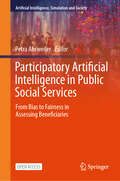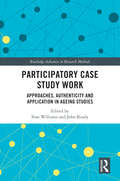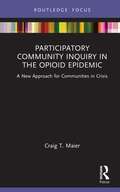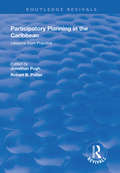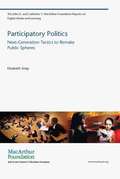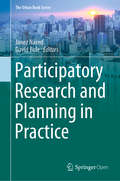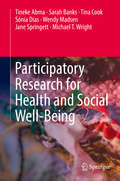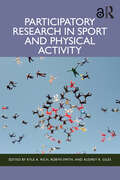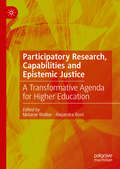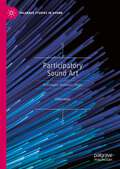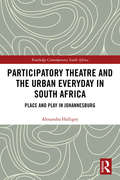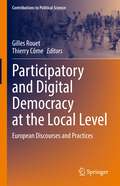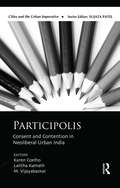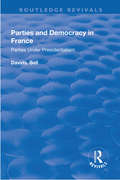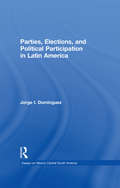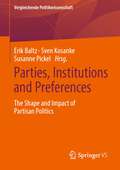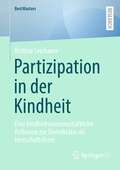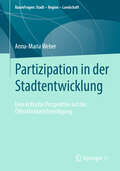- Table View
- List View
Participative Management: An Analysis of its Effect on Productivity (Routledge Library Editions: Employee Ownership and Economic Democracy #13)
by Dr Michael SwearingenThis study, first published in 1997, examines the relationship between the style of management used and the level of productivity, measured in terms of the organization’s financial stability. Other variables examined include the age of the top level managers, their educational level, the size and age of the organization, and the organization’s physical parameters. By determining whether or not productivity is affected by the use of a participative style of management, the author is laying the groundwork for making companies more competitive.
Participatory Action Research
by William Foote WhyteThis text provides perspectives on the practice and evolution of participatory action research.
Participatory Action Research Approaches and Methods: Connecting People, Participation and Place (Routledge Studies in Human Geography)
by Rachel Pain Mike Kesby Sara KindonParticipatory Action Research (PAR) approaches and methods have seen an explosion of recent interest in the social and environmental sciences. PAR involves collaborative research, education and action which is oriented towards social change, representing a major epistemological challenge to mainstream research traditions. It has recently been the subject of heated critique and debate and rapid theoretical and methodological development. This book captures these developments, exploring the justification, theorisation, practice and implications of PAR. It offers a critical introduction to understanding and working with PAR in different social, spatial and institutional contexts. The authors engage with PAR’s radical potential, while maintaining a critical awareness of its challenges and dangers. The book is divided into three parts. The first part explores the intellectual, ethical and pragmatic contexts of PAR; the development and diversity of approaches to PAR; recent poststructuralist perspectives on PAR as a form of power; the ethic of participation; and issues of safety and well-being. Part two is a critical exploration of the politics, places and practices of PAR. Contributors draw on diverse research experiences with differently situated groups and issues including environmentally sustainable practices, family livelihoods, sexual health, gendered experiences of employment, and specific communities such as people with disabilities, migrant groups, and young people. The principles, dilemmas and strategies associated with participatory approaches and methods including diagramming, cartographies, art, theatre, photovoice, video and geographical information systems are also discussed. Part three reflects on how effective PAR is, including the analysis of its products and processes, participatory learning, representation and dissemination, institutional benefits and challenges, and working between research, action, activism and change. The authors find that a spatial perspective and an attention to scale offer helpful means of negotiating the potentials and paradoxes of PAR. This approach responds to critiques of PAR by highlighting how the spatial politics of practising participation can be mobilised to create more effective and just research processes and outcomes. The book adds significant weight to the recent critical reappraisal of PAR, suggesting why, when, where and how we might take forward PAR’s commitment to enabling collaborative social transformation. It will be particularly useful to researchers and students of Human Geography, Development Studies and Sociology.
Participatory Action Research in Natural Resource Management: A Critque of the Method Based on Five Years' Experience in the Transamozonica Region of Brazil
by Carl F. Jordan Christian CastellanetThis work evaluates the merits of a widely-used approach to natural resource management, participatory action research (PAR), an approach to resource management that strives to link researchers with farmers and other local residents whose lives are effected by long-range conservation programmes. The authors begin the book with the history of PAR, and then use a variety of case studies that chronicle sustainable development efforts in Brazil. They evaluate the strengths and weaknesses of these efforts and suggest specific ways to improve on future PAR efforts.
Participatory Activist Research in the Globalised World
by Gregory Martin Elke Emerald LisahunterAction research was conceived as a method of collaborative, self-reflective problem-solving in a community context. Yet many believe it has evolved too far away from its original, directly activist roots. As a direct response to calls for a rejuvenation of the social agenda of 'action research', this volume provides an all-inclusive road map to generating and implementing politically active grass-roots research activities. It is a priceless practical guide for the newly minted researcher wanting to make a tangible difference in their profession and in the world. Where some action research models have been criticized for losing focus on the participatory and social justice roots of this type of research, this book puts social justice activism squarely center stage, guiding the researcher through the theoretical, methodological and practical considerations and constraints of developing, implementing and sustaining research in the cultural professions. Lcating and contextualizing the history and theory of action research, critical theory and other related methodologies and concepts, this volume takes the reader on a journey that begins with the formation of a question, puzzle or research idea right through to the publication of a report on your finished project. Including discrete sections on every stage in the process, from generating a social justice activism agenda, through forming a team and empowering participants, to ensuring the implementation of your agenda and publishing and disseminating your work. Engaging their readers with a fresh acronym, PAtR--Participatory Activist Research--the authors give fresh impetus to those looking for a systematic way to understand and shape practice in their daily work, their profession and their world. This is an outstanding book that represents a critical research process sorely needed in the academy today. Any researcher interested in making an intervention into the egregious social conditions wrought by neoliberal capitalism would do well to read this book. An important contribution to the literature on research methodology. Peter McLaren, Professor, School of Critical Studies in Education, University of Auckland This is an outstanding book that represents a critical research process sorely needed in the academy today. Any researcher interested in making an intervention into the egregious social conditions wrought by neoliberal capitalism would do well to read this book. An important contribution to the literature on research methodology. Peter McLaren, Professor, School of Critical Studies in Education, University of Auckland
Participatory Artificial Intelligence in Public Social Services: From Bias to Fairness in Assessing Beneficiaries (Artificial Intelligence, Simulation and Society)
by Petra AhrweilerThis open access edited volume focuses on fairness issues concerning the use of artificial intelligence (AI) for social service provision in national welfare systems. With this, it touches upon important questions in the innovation agenda of countries across continents about the ethics, justice, quality, responsibility, accountability, and transparency to use AI for state functions. The volume shows that in many countries, AI, or at least data analytics methods, are already in place to support the assessment of beneficiaries for deciding on the value criteria to distinguish between legal /fraudulent, deserving/non-deserving, or needy/non-needy recipients. The book provides a cross-cultural comparison of AI-based social assessment among national welfare systems of 9 countries across 4 continents: Spain, Estonia, Germany, Iran, India, Nigeria, Ukraine, China and USA. Based on participatory research results from multi-stakeholder inputs, especially those from vulnerable groups, the chapters in this volume show that value criteria for fairness and social justice are context-bound and vary across the globe. Furthermore, they are in constant flux, aligned to social change. Thus, the volume looks at pathways to developing culture-sensitive, responsive and participatory AI for social assessment in public service provision. The contributions are interdisciplinary and introduce perspectives from the fields of sociology, computational social science, computer science and public policy. This topical volume is of interest to a wide readership.
Participatory Case Study Work: Approaches, Authenticity and Application in Ageing Studies (Routledge Advances in Research Methods)
by Sion Williams and John KeadyParticipatory Case Study Work shows academic co-researchers how to adapt and implement their methods so that data collection and analysis is authentically participatory. At the heart of this text is advocating a participatory approach to case study work, with co-construction as a catalyst for shared understanding and action in advancing ageing studies. Whilst case study research has a relatively long tradition in the canon of research methodologies, little attention has so far been paid to the importance and value of participatory case study work. This is surprising as its egalitarian and democratic value-base naturally lends itself to the co-production and co-creation of personal and collective theory drawn directly from lived experience. The book brings together over 15 years’ worth of participatory case study work in ageing studies in which the editors have been actively involved as either front-line researchers or as supervisors to PhD and MPhil studies adopting the methodology, and from where each of the contributors are selected. Real-life case examples are shared in the main chapters of the book and they provide direction as to how learning can be applied to other settings. The chapters also contain key references and recommended reading. This volume will appeal to undergraduate and postgraduate students as well as postdoctoral researchers interested in fields such as: Research Methods, Qualitative Methods, Ageing Studies and Mental Health Studies.
Participatory Community Inquiry in the Opioid Epidemic: A New Approach for Communities in Crisis (Routledge Focus on Communication Studies)
by Craig T. MaierThis book explores a research project focused on finding a community-level response to the opioid epidemic. Grounded in communication ethics, appreciative inquiry, and action research, this book contends that the opioid epidemic in the United States is as much a social disease as it is a pharmaceutical one, arising from a lack of social connection and the “communal literacy” Americans need to deal with the challenges they face together. Asking how Americans can rediscover their social connection to rebuild vibrant, sustainable communities, the author proposes and tests an approach called Participatory Community Inquiry (PCI), which helps groups acknowledge the social goods that unite them, design practices that protect and promote those goods, and undertake actions that can support their common lives. Shaping the conversation on how Americans may rediscover and rebuild the community they have lost, this book will be a key resource for researchers, practitioners, and students in communication studies, sociology, and action research interested in social ethics and community development and organizing.
Participatory Planning in the Caribbean: Lessons from Practice
by Robert Potter Jonathan PughThis title was first published in 2003. Until recently, planning and development in the Caribbean have been "top-down", "centre-out" and "expert-led". For a few years now, though, the region has bowed to the global trend and has experimented with participatory planning methods. Participatory planning is heralded by much of the development community as the most appropriate alternative strategy to the traditional approaches. In this volume, a range of experts drawn from the Caribbean, the United Kingdom and the United States review the current achievements and future prospects for genuinely participative planning in the Caribbean region at the beginning of the 21st Century. Bringing together a wide range of case studies from both the insular Caribbean as well as mainland Central and South America, the book examines issues such as protected area planning, sustainable development councils, gender and development, inner-city redevelopment and community empowerment.
Participatory Politics
by Elisabeth SoepAlthough they may disavow politics as such, civic-minded young people use every means and media at their disposal to carry out the basic tasks of citizenship. Through a mix of face-to-face and digital methods, they deliberate on important issues and debate with peers and powerbrokers, redefining some key dynamics that govern civic life in the process. In Participatory Politics, Elisabeth Soep examines the specific tactics used by young people as they experiment with civic engagement. Drawing on her scholarly research and on her work as a media producer and educator, Soep identifies five tactics that are part of effective, equitable participatory politics among young people: Pivot Your Public (mobilizing civic capacity within popular culture engagements); Create Content Worlds (using inventive and interactive storytelling that sparks sharing); Forage for Information in public data archives; Code Up (using computational thinking to design tools, platforms, and spaces for public good); and Hide and Seek (protecting privacy and information sources). After describing these tactics as they manifest themselves in a range of youth-driven activities -- from the runaway spread of the video Kony 2012 to community hackathons -- Soep discusses concrete ideas for cultivating the new literacies that will enable young people to participate in public life. She goes on to consider some risks associated with these participatory tactics, including simplification and sensationalism, and ways to avoid them, and concludes with implications for future research and practice.
Participatory Research and Planning in Practice (The Urban Book Series)
by Janez Nared David BoleThis open access book provides in-depth insights into participatory research and planning by presenting practical examples of its use. In particular, it describes theoretical and methodological aspects of participatory research and planning, as well as the implementation of participatory processes in fields such as transport planning, cultural heritage management, environmental planning and post-earthquake recovery. Further, it compares participatory planning experiences from different territorial levels – from the macro-regional, e.g. Southeastern Europe, Mediterranean or European metropolitan regions, to national, regional and local levels.The book will help researchers, planners, public administration officials, decision-makers and the general public to understand the advantages, disadvantages and constraints of participatory planning and research. Using various examples, it will guide readers through the theory of participatory planning and research, its methods, and different perspectives on how to use it in practice.
Participatory Research for Health and Social Well-Being
by Sarah Banks Wendy Madsen Jane Springett Michael T. Wright Tineke Abma Tina Cook Sónia DiasThis textbook is a comprehensive guide for students interested in using participatory research to improve people’s health and well-being. It is especially designed for those working in the fields of health and social welfare who are embarking on participatory research for the first time. It covers all phases in participatory research from “getting started,” to “acting for change,” “continuing the journey” and “articulating impact.” Its unique format helps readers understand the essence of participatory research as a comprehensive approach for doing research which is underpinned by a set of fundamental values.The many real life examples of participatory research projects from around the world inspire readers to find creative ways to manage their own research while opening up new horizons in their work.
Participatory Research in Sport and Physical Activity (Qualitative Research in Sport and Physical Activity)
by Robyn Smith Kyle A. Rich Audrey R. GilesThis is the first book to focus on participatory research in the context of sport and physical activity. It explores the transformative potential of participatory research methods and provides an introduction to the practicalities of doing participatory research in sport and physical activity.The book is structured around phases of the research process, covering research design, data collection, data analysis, and knowledge mobilization and translation. Chapters cover research design topics such as building research partnerships, reflexivity and ethical issues; methods such as social photo-elicitation, go-along interviews, and biographical mapping; analytical approaches such as collective memory work and collaborative analysis; and knowledge mobilization and translation topics such as podcasting, digital tools, and peer review. Every chapter includes a review of key developments, a guide to how that approach can be employed, an example from the author’s own work, and critical reflections on how that approach can shape future research and have an impact on public discourse.This book is an invaluable resource for students and researchers working in sport studies, the sociology of sport, sport and exercise psychology, sport management and policy, and human movement and health studies more broadly. It will be particularly useful for those interested in diverse and inclusive approaches to qualitative research methodologies.
Participatory Research, Capabilities and Epistemic Justice: A Transformative Agenda for Higher Education
by Melanie Walker Alejandra BoniThis book explores the potential of participatory research and the capability approach to transform understandings of higher education. The editors and contributors illuminate the importance of epistemic in/justice as a foundation to a reflexive, inclusive and decolonial approach to knowledge, as well as its importance to democratic life and participation in higher education. Drawing together eight global case studies, the authors argue for an ecology of knowledge that expands epistemic capabilities in higher education through teaching, research and policy making. Moreover, the chapters illustrate how these epistemic capabilities can be marginalised by both institutions and structural and historical factors; as well as the potential for possibilities when spaces are opened for genuine participation and designed for a plurality of voices. This book will appeal to scholars of social justice and participatory research as well as ongoing debates around decolonising the academy.
Participatory Sound Art: Technologies, Aesthetics, Politics (Palgrave Studies in Sound)
by Vadim KeylinThis book addresses a major gap in sound art scholarship: the role of audience participation. It offers a survey of participatory sound art from its origins in the historical avant-gardes to the non-institutionalized forms of sonic creativity in contemporary digital culture. In doing so, it proposes an innovative theoretical framework for analysing such phenomena, rooted in Pragmatist aesthetics, affordance theory and postcritique. Combining artwork analyses with qualitative studies, it focuses on three principal aspects of participatory sound art: the ways the materialities of the artworks facilitate and structure the participatory processes; the interplay of the creative agencies of the artists and the participants; and the postcritical approach to sound art’s politics, unfolding through the participants’ affective gestures. In considering these multiple dimensions, this book contributes to the growing fields of sound studies and participation studies, as well as to curatorial practice regarding sound art and participatory art.
Participatory Theatre and the Urban Everyday in South Africa: Place and Play in Johannesburg (Routledge Contemporary South Africa)
by Alexandra HalligeyThis book explores theatre and performance as participatory research practices for exploring the everyday of the city. Taking an inner-city suburb of Johannesburg, South Africa as its central case study, the book considers how theatre and performance might be both useful practical tools in considering the everyday city, as well as conceptual lenses for understanding it. The author establishes an understanding of space as ever evolving and formed through the ongoing relationship between things, human and non-human, and considers how theatre and performance offer useful paradigms for learning about and working with city spaces. As ephemeral, embodied, material artistic practices, theatre and performance mirror the nature of everyday life. The book discusses theatre and performance games and placemaking processes as offering valuable ways of discovering daily acts of place-making and providing insights that more conventional research methods may not allow. Yet the book also considers how seeing daily city life as a kind of performance, a kind of theatre in its own right, helps to further understandings of city spaces as ever evolving through complex webs of relationships. This book will be of interest to academics, academic practitioners and post-graduate students in the fields of theatre and performance studies, urban studies and cultural geography.
Participatory and Digital Democracy at the Local Level: European Discourses and Practices (Contributions to Political Science)
by Gilles Rouet Thierry CômeThis edited volume discusses digital democracy at the local level in Europe. Contrasting the political discourse surrounding participatory digital democracy with actual experiences of implementation, the book provides a wholistic view of digital democracy across Western, Central, and Eastern Europe. The book is divided into three parts. Chapters in Part I analyze discourses about participatory democracy in Europe. Chapters in Part II provide case studies of digital democracy practices at the local level in the EU. Chapters in Part III discuss the risks and challenges associated with digital democracy. Written by a panel of international, interdisciplinary experts, this volume will be of interest to researchers, students, and practitioners across public administration, political science, economics, management, and sociology.
Participolis: Consent and Contention in Neoliberal Urban India (Cities And The Urban Imperative Ser.)
by Karen Coelho; Lalitha Kamath; M. VijayabaskarWhile participatory development has gained significance in urban planning and policy, it has been explored largely from the perspective of its prescriptive implementation. This book breaks new ground in critically examining the intended and unintended effects of the deployment of citizen participation and public consultation in neoliberal urban governance by the Indian state.The book reveals how emerging formats of participation, as mandatory components of infrastructure projects, public–private partnership proposals and national urban governance policy frameworks, have embedded market-oriented reforms, promoted financialisation of cities, refashioned urban citizenship, privileged certain classes in urban governance at the expense of already marginalised ones, and thereby deepened the fragmentation of urban polities. It also shows how such deployments are rooted in the larger political economy of neoliberal reforms and ascendance of global finance, and how resultant exclusions and fractures in the urban society provoke insurgent mobilisations and subversions.Offering a dialogue between scholars, policy-makers and activists, and drawing upon several case studies of urban development projects across sectors and cities, this volume will be useful for planners, policy-makers, academics, development professionals, social workers and activists, as well as those in urban studies, urban policy/planning, political science, sociology and development studies.
Parties and Democracy in France: Parties Under Presidentialism (Routledge Revivals)
by David S BellThis title was first published in 2000: The Presidency has been the principal political focus of the French Fifth Republic and the new component of French democracy. This book looks at how the Presidency has shaped political parties and party systems, as well as how they have interacted with the new institution. The Presidency has acted as a unifying force, bringing together coalitions of parties to provide a political basis for presidential power, but has also been a divisive factor. Parties draw on longstanding traditions of French political life and the Presidency can provoke destructive rivalry as well as constructive coalition-building. Presented here is a discussion of the contemporary French party system - its dynamics, successes and failures. Written in an accessible style, it is intended for students of French studies and political parties, as well as comparative politics.
Parties, Elections, and Political Participation in Latin America (Essays on Mexico Central South America)
by Jorge I DominguezFirst Published in 1994. This is Volume five of seven of a collection of essays that gathers together scholarly debates from the 1950s to the 1990s on Mexico, Central and South America. This text looks at topics such as government parties in Latin America, the Mexican elections of 1958, political campaigning, the scope of the Chilean Party systems, the case of Peronism and electoral change amongst others.
Parties, Institutions and Preferences: The Shape and Impact of Partisan Politics (Vergleichende Politikwissenschaft)
by Susanne Pickel Erik Baltz Sven KosankeThe book focuses on the traditional view of party-voter representation, parties and their respective positions, and party systems as central actors, the role of governmental institutions as well on policy inputs, outputs, and outcomes and the agenda setting process. The fundamental characteristics of the political actors such as political parties and the party system and their ideological composition are dealt with. The role governmental institutions play in the policy making process are exemplified covering the characteristics of the agenda-setting power and the consequences for the government’s survival. The results of these mechanisms are analyzed while focusing on some classical policies of comparative research such as social and environmental policy.
Partisan Dealignment and the Blue-Collar Electorate in France
by Sally MarthalerThis book explores partisan dealignment in France between 1978 and 2012, with a particular focus on the blue-collar electorate and its relationship with the political parties of the established left (the Socialist Party, or Parti socialiste, and the Communist Party, or Parti communiste français). It highlights the distinctiveness of blue-collar partisanship in a context of significant political, social and economic change and compares it with patterns of partisanship in the wider electorate. The voter-party relationship is self-evidently a bilateral one which can be modified both on the demand side, because voters change, and on the supply side, because parties change. Four factors are identified as playing a key role in partisan dealignment: value change, policy convergence, political sophistication and political trust. There is compelling evidence that while each of these makes a contribution, it is changes in the behaviour of the parties that are driving partisan dealignment among blue-collar workers in France.
Partizipation in der Kindheit: Eine kindheitswissenschaftliche Reflexion zur Demokratie als Herrschaftsform (BestMasters)
by Bettina LeichauerPartizipation oder auch Kinder- und Jugendbeteiligung beziehen sich u. a. auf eine unterschiedlich umfänglich alltagsgerichtete Teilhabe von jungen Menschen und eine zukunftsorientierte Demokratiebildung. Bei der fast schon inflationären Verwendung des Begriffs "Partizipation" bleibt jedoch häufig unklar, was darunter verstanden wird oder werden soll. Eingebettet in den gesellschaftlichen Kontext der Demokratie als Herrschaftsform wird das dualistische Verhältnis von Partizipation als Chance für Entscheidungsbetroffene versus Partizipation als Instrument der Herrschenden aufgezeigt. Denn auch wenn Partizipation im öffentlichen Diskurs verspricht, eine Möglichkeit des Mitredens und -wirkens zu sein, muss sie nicht zwangsläufig auf Veränderung zielen, sondern kann gleichermaßen bestehende Ungleichheitssysteme stabilisieren. Mit Blick auf Kindheit gilt es besonders die Ungleichheit von Akteur*innen innerhalb der generationalen Ordnung hervorzuheben. Es wird sich mit der Frage auseinandergesetzt, wie Partizipation unter Ungleichen innerhalb dieser generationalen Verortungen und der damit verbunden asymmetrischen Sozialisationsarrangements überhaupt gelingen kann und welchen Möglichkeitsräumen, Restriktionen und Gefahren des Machtmissbrauchs sie unterliegt.
Partizipation in der Stadtentwicklung: Eine kritische Perspektive auf die Öffentlichkeitsbeteiligung (RaumFragen: Stadt – Region – Landschaft)
by Anna-Maria WeberÖffentlichkeitsbeteiligung wurde viele Jahre als Allheilmittel für eine erfolgreiche Umsetzung von Stadtplanungs- und -entwicklungsprozessen angesehen. Immer deutlicher jedoch wird, dass die alltäglichen Erfahrungen auf kommunaler Ebene häufig stark von den normativen Erwartungen und Anforderungen der Theorie abweichen und unintendierte Nebenwirkungen auftreten. Daran anknüpfend wirft die Arbeit einen kritischen Blick auf die Öffentlichkeitsbeteiligung bei Stadtplanungs- und -entwicklungsprozessen und untersucht am Beispiel der Stadt Riedlingen, was die Gründe für den (Miss-)Erfolg von Partizipationsprozessen sind. Anhand von qualitativen leitfadengestützten Interviews mit Bürger*innen und Vertreter*innen von Stadtverwaltung und den beauftragten planenden und beratenden Büros sowie auf Basis eines sozialkonstruktivistischen Zugriffs kombiniert mit der Systemtheorie nach Luhmann kann aufgezeigt werden, dass die Konstruktion der Öffentlichkeitsbeteiligung sowohl von den individuellen Erfahrungen und persönlichen Interessenslagen, als auch den systemischen Logiken der involvierten Akteure abhängig ist, wodurch eine erfolgreiche Kommunikation zwischen den involvierten Akteuren unwahrscheinlich wird. Aus den empirischen Befunden geht überdies hervor, dass die Erfahrungen mit und Bewertungen von den gegenwärtigen Beteiligungsverfahren in Riedlingen überwiegend negativ gefärbt sind. Als Gründe für den Misserfolg der Partizipationsprozesse werden vor allem die geringe und selektive Beteiligung, die begrenzten Möglichkeiten der Einflussnahme, fehlendes Lokalwissen der beauftragten Büros, die Unübersichtlichkeit der Verfahren und deren Einbettung in die Projektplanung sowie die unzureichenden Umsetzungen der geäußerten Anliegen hervorgehoben. Anhand der Ausführungen der Interviewpartner*innen wird deutlich, dass die Öffentlichkeitsbeteiligung in Riedlingen eher zu Frustration und Vertrauensverlust führt, statt in einer gesteigerten Legitimation und Akzeptanz von Planungsprojekten resultiert und es daher einer kritischen Selbstreflektion und Nachjustierung von Partizipationsprozessen bedarf.
Partizipation und Un_gleichzeitigkeit: Eine Herausforderung für die Mitbestimmung
by Ronald Staples Werner Widuckel Michael Whittall Natalie Bella Julia Gamradt Matthäus WilgaDas Buch befasst sich mit der digitalen Transformation in Unternehmen und fragt nach den Veränderungen für die betrieblichen Stakeholder. Im Mittelpunkt steht der Umgang von betrieblicher Mitbestimmung mit digitaler Transformation. Dies setzt auch eine Transformation betrieblicher Mitbestimmung selbst auf die Tagesordnung, die die direkte Partizipation der Beschäftigten an der interessenpolitischen Positionierung des Betriebsrats und deren Durchsetzung gegenüber dem Arbeitgeber deutlich erweitert und zu einer strategischen Ressource der Mitbestimmung werden lässt.
